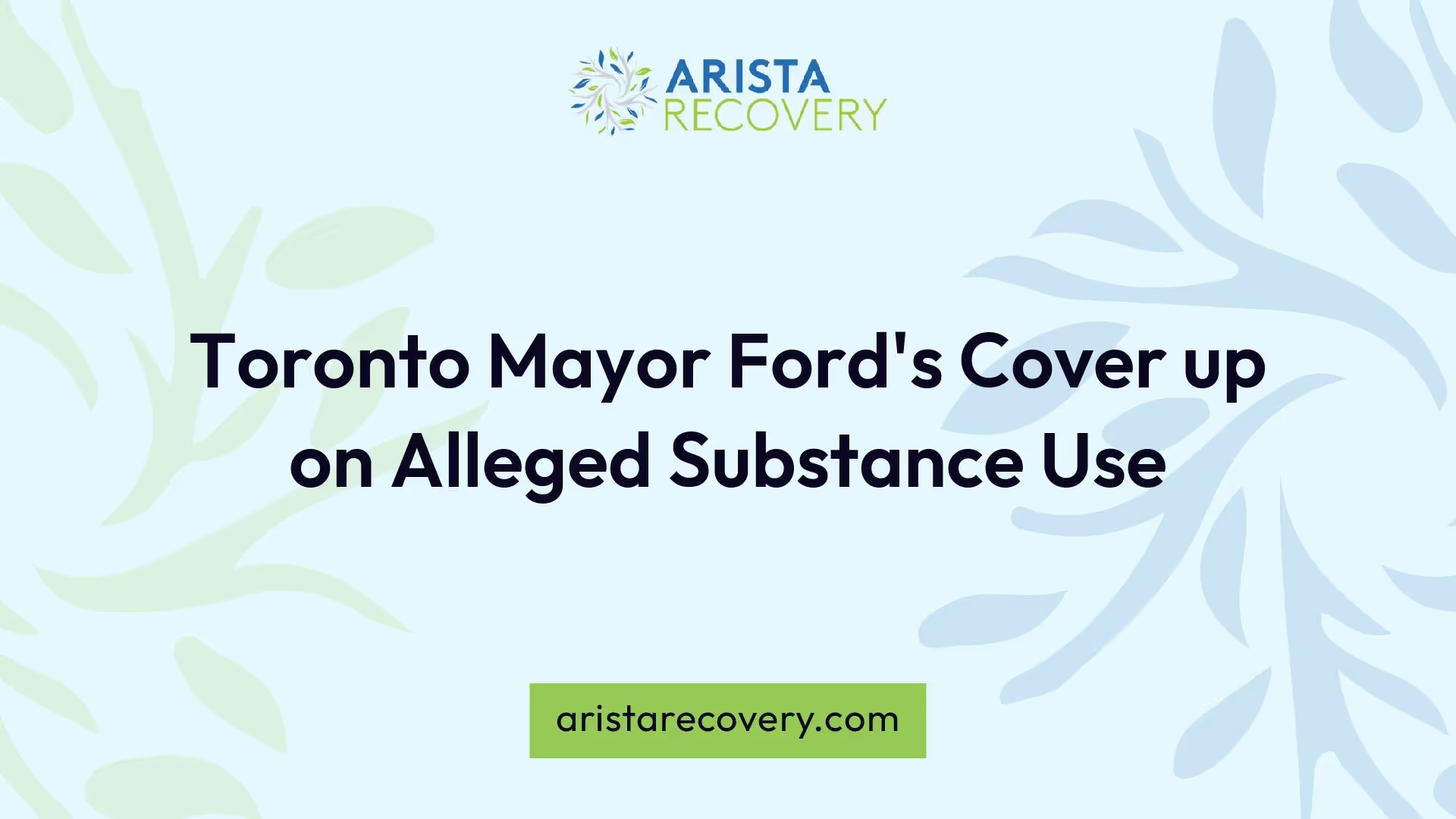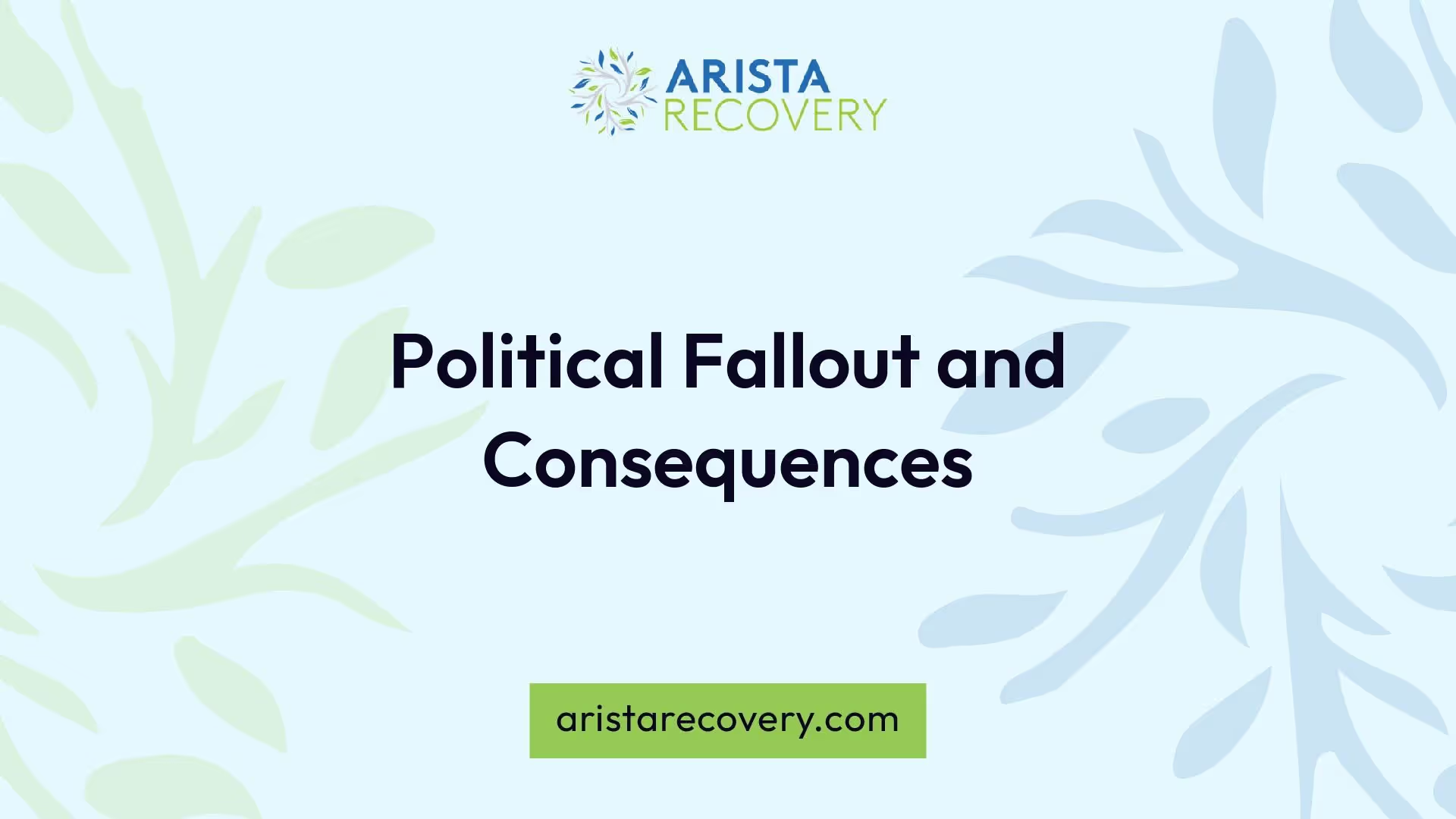Toronto Mayor Ford's Cover up on Alleged Substance Use

The Rob Ford Substance Use Scandal
The revelation of Toronto Mayor Rob Ford's substance use scandal sent shockwaves through the political landscape. Ford's admission, alongside the subsequent unraveling of the cover-up, exposed a turbulent chapter in municipal governance.

Mayor Ford's Admission
In a stunning turn of events, Mayor Ford made a candid admission regarding his substance use, particularly crack cocaine. Initially denying any involvement with illegal substances, Ford's confession came after intense scrutiny and mounting evidence. He acknowledged smoking crack cocaine in what he described as a "drunken stupor" approximately a year prior, a stark contrast to his earlier denials [2].
Unraveling of the Cover-Up
The cover-up surrounding Mayor Ford's substance use slowly began to unravel as more details emerged. Despite his initial recalcitrance, Ford found himself ensnared in revelations that contradicted his earlier statements. The existence of a video capturing him engaged in illicit drug use added fuel to the already incendiary situation [3].
As the layers of deceit peeled away, Ford's admission to broader substance use beyond alcohol laid bare the extent of his struggles. The admission to a pattern of substance misuse underscored the complexity of addiction and the challenges faced by individuals navigating the tumultuous path to recovery [3].
The unveiling of Mayor Ford's substance use scandal, from denial to admission, marked a turbulent period characterized by political fallout and personal introspection. The repercussions of his actions extended far beyond the realm of municipal politics, serving as a cautionary tale on the perils of addiction and the importance of transparency in public office.
Political Fallout and Consequences
The revelation of Toronto Mayor Rob Ford's substance use scandal sent shockwaves through the political landscape, sparking a series of events that would have lasting repercussions. The fallout from the scandal culminated in significant calls for his resignation and the subsequent limitation of his powers within the city council.

Calls for Resignation
Following the release of video evidence confirming Mayor Ford's substance use, political opposition and concerned citizens alike fervently demanded his resignation. The calls for Mayor Ford to step down intensified as the gravity of the scandal became apparent, leading to debates within the city council about his fitness to continue serving as mayor.
Limitation of Powers
In a pivotal moment in November 2013, the Toronto City Council voted decisively to strip Mayor Rob Ford of most of his powers as a direct response to his refusal to resign despite mounting pressures. The vote, passed with a significant majority, relegated Mayor Ford mainly to ceremonial duties, severely curtailing his ability to govern effectively.
The motion to limit Mayor Ford's powers included suspending his authority to appoint and dismiss the deputy mayor and his executive committee. This marked a critical turning point in the aftermath of the scandal, showcasing the council's resolve to address the situation and prevent further ramifications of Mayor Ford's conduct [4].
Despite these actions, the city council faced challenges in forcing Mayor Ford out of office, as their authority to remove him was contingent upon a criminal conviction. Nonetheless, efforts persisted to limit Mayor Ford's remaining powers, with plans to further restrict his budget authority and designate the deputy mayor as the executive committee head, demonstrating a unified stance against Mayor Ford's actions.
Mayor Ford's Confessions
Throughout the scandal surrounding Toronto Mayor Ford's alleged substance use, his confessions played a significant role in shaping public perception and the actions taken by the City Council. Ford's confessions transitioned from denial to admission, ultimately leading to a rehabilitation decision.
Denial to Admission
Initially, Mayor Ford vehemently denied the existence of any incriminating video footage showcasing his drug use. Despite persistent allegations and mounting evidence, Ford maintained his innocence and rejected accusations of substance abuse. The turning point came on October 31, 2013, when Toronto police confirmed the recovery of a video file depicting Mayor Ford smoking crack cocaine, contradicting his previous denials.
Following the revelation of the video, public pressure intensified, pushing Ford to confront the truth. In November 2013, Mayor Ford finally came clean and admitted to smoking crack cocaine, attributing the incident to "one of my drunken stupors". This pivotal moment marked a significant shift in the narrative surrounding Mayor Ford's alleged substance use, sparking widespread debate and scrutiny over accountability and transparency in public officials.
Rehabilitation Decision
Upon acknowledging his substance use and the ensuing public backlash, Mayor Ford made a pivotal decision to seek rehabilitation. His admission of using a wide range of substances beyond alcohol shed light on the complexities of addiction and the challenges faced by individuals battling substance abuse.
Ford's rehabilitation journey was closely monitored by the public and the media, with his actions under intense scrutiny. The decision to seek treatment not only aimed to address his personal struggles but also served as a symbolic gesture of accountability and commitment to overcoming his addiction issues. Mayor Ford's rehabilitation decision underscored the importance of seeking help and confronting addiction, even in the midst of a high-profile scandal.
Mayor Ford's transition from denial to admission, culminating in his rehabilitation decision, epitomized a tumultuous period marked by revelations, public outcry, and calls for accountability. The journey of acknowledging addiction and taking steps towards recovery highlighted the complexities and challenges associated with substance use, particularly in the context of public figures and political scrutiny.
Impact on Mayor Ford's Popularity
The revelation of Toronto Mayor Rob Ford's substance use cover-up had a profound impact on his public image and popularity. This section delves into the decline in his approval ratings and the legal and political consequences that ensued.
Decline in Approval Ratings
Prior to the scandal, Mayor Ford's approval ratings stood at 44%. However, following the admission of his substance use cover-up, his popularity plummeted significantly, dropping to a mere 15% [2]. This sharp decline in approval ratings reflected the public's disillusionment and loss of confidence in his leadership.
Legal and Political Ramifications
The scandal surrounding Mayor Ford's substance use cover-up not only tarnished his reputation but also resulted in severe legal and political consequences. As Mayor Ford vehemently denied being an addict initially and attributed his behavior to a "drunken stupor," the eventual admission of smoking crack cocaine in November 2013 exposed a pattern of substance abuse that dated back to before his election [3].
In the wake of these revelations, Mayor Ford faced mounting pressure to resign from his position. Despite the calls for his resignation, he chose to remain in office, leading to further turmoil and controversy in the political landscape of Toronto.
The legal and political ramifications extended beyond public opinion, culminating in Mayor Ford being stripped of most of his powers by the city council. This decisive action underscored the repercussions of the cover-up and placed Mayor Ford in a weakened position as a political figure.
The impact on Mayor Ford's popularity and the ensuing legal and political ramifications serves as a cautionary tale highlighting the importance of transparency and accountability in public office. The fallout from the substance use scandal reverberated throughout Toronto, leaving a lasting mark on Mayor Ford's tenure and legacy.
City Council Actions
The revelation of Toronto Mayor Ford's alleged substance use scandal sparked a series of actions by the Toronto City Council as they grappled with the repercussions of the situation.
Stripping of Powers
In November 2013, amidst escalating allegations and public outcry, the Toronto City Council took decisive action by voting to limit Mayor Ford's authority. The council's decision resulted in a transfer of a significant portion of Ford's powers and responsibilities to Deputy Mayor Norm Kelly for the remainder of Ford's term. This move signified a significant breakdown in trust between Ford, his constituents, and the city council.
The council's resolution, approved with a notable 39-3 majority, suspended Ford's ability to appoint and dismiss the deputy mayor and his executive committee, effectively reducing his influence and decision-making capacity within the council [4].
Continued Efforts and Resolutions
Following the initial stripping of Mayor Ford's powers, the Toronto City Council demonstrated its commitment to addressing the situation by planning further actions. A motion was proposed to strip Ford of most of his remaining powers, focusing on revoking his budgetary authority and appointing the deputy mayor as the head of the executive committee. This proposed motion had garnered support from a significant number of council members, with 28 out of 44 already signing in favor of the move.
The ongoing efforts of the Toronto City Council underscored the gravity of the situation and the necessity for decisive action in response to Mayor Ford's alleged substance use scandal. By persisting in their resolve to restrict Ford's powers and implement further measures, the council aimed to address the implications of the scandal and uphold the integrity of the city's governance structure.
References
[2]:
[3]:
[4]:
[5]:
[6]:
You’re not alone in this.
When mental health challenges and addiction intersect, it can feel isolating. At Arista, we offer compassionate, evidence-based, and trauma-informed care to help you heal, grow, and move forward.
You’re not alone in this.
When mental health challenges and addiction intersect, it can feel isolating. At Arista, we offer compassionate, evidence-based, and trauma-informed care to help you heal, grow, and move forward.
Support that moves with you.
You’ve taken a brave first step. At Arista Recovery, we’re here to help you continue with best-in-class care designed for long-term healing and support.
.webp)






